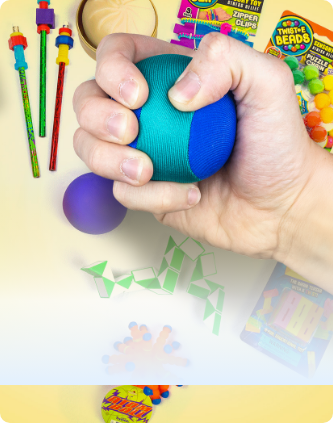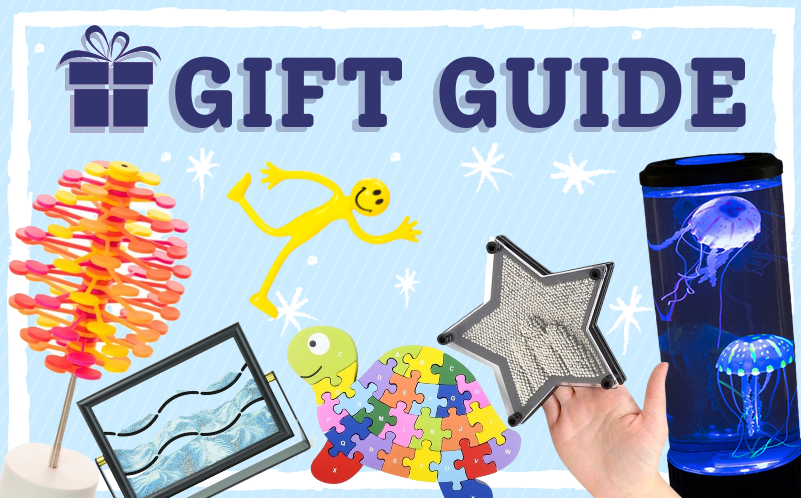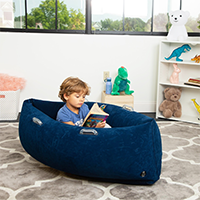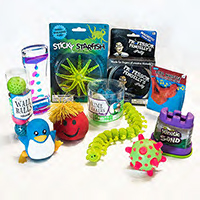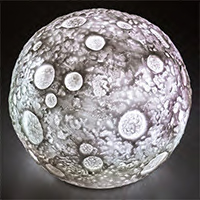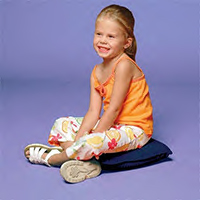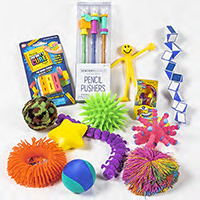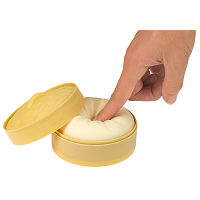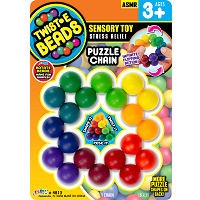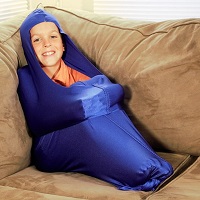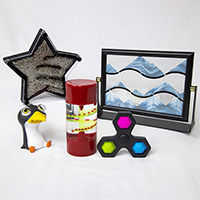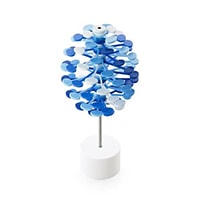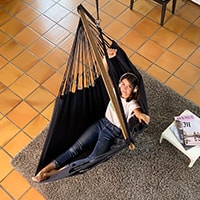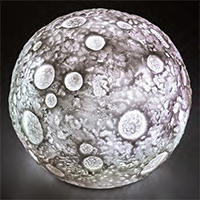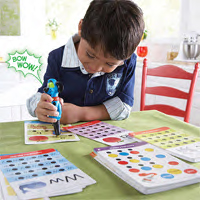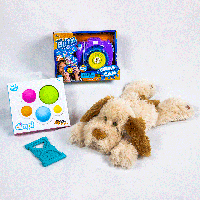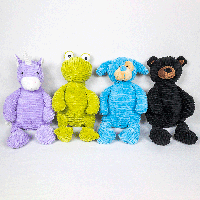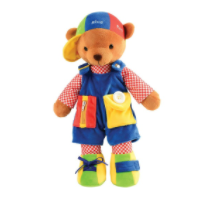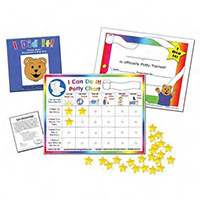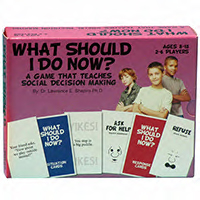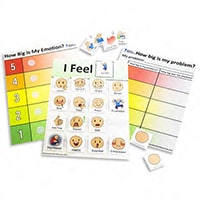In This Guide
You can shop by developmental ages
We will cover the following kinds of toys:
Buying a toy or gift for someone on the autism spectrum can be challenging. During the holidays we receive many calls asking our product specialists for gift advice. Based on these questions our product specialists have put together this guide to help you choose the best gifts for kids, teens, and adults on the autism spectrum.
Often individuals on the spectrum have strong interests in a certain topic. If this is the case books or gift items that relate to their interests are always a hit. However, this can be difficult depending on the interest. If your loved one has a very specific interest start shopping early for their gift.
Consider Buying a Calming Gift
While enjoyable, unfortunately the holidays and special occasions can often create extra stress. Kids and teens on the spectrum often have difficulty with changes to their routine because of miscommunication, not understanding what is expected of them, or overwhelming sensory experiences. It is important to remember that their sensory threshold can be lower than the general population and common daily experiences can be painful or very tiring. For example, one child shared that a vacuum cleaner "sounds like a drill on my ears."
Calming gifts are often very well received and can help with some of these challenges. A soothing gift is not only enjoyable but can also make life easier for the whole family. Some calming gift ideas include soothing visual items and toys or gifts that provide deep pressure or vibration.
Soothing visual gifts provide slow, repetitive motion that is visually engaging and calming. Our most popular visual items include:
- The Jellyfish Lamp slowly changes colors as two large jellyfish slowly swim through the water.
- The Tranquil Turtle projects a rippling water light effects on any ceiling. It also has soft music or wave sounds with adjustable sound.
- The Tornado Lamp slowly changes colors as water swirls around.
- The Moon Light slowly changes colors as you watch it.
Weighted items also make good calming gifts. These items provide deep pressure that causes your body to move from a "fight or flight" mode to a restful state. These items help the body to physically move from a restless or anxious state to a calmer feeling body by helping to lower a fast heart rate or by slowing down breathing.
Some calming gifts can be more expensive but they will last for years if they are well made. Check out our weighted blankets and adorable weighted stuffed animals that make great calming and soothing travel companions. Your loved one will enjoy our popular weighted sloth.
Many autistic children and teens enjoy gentle massage items like our vibrating pillow. This pressure activated pillow vibrates when you squeeze it, saving battery life. When considering massage items look for things that vibrate and are easily controlled by the individual. Our advisory board has found that deep tissue or shiatsu massage does not work as well as gentle vibration.
POPULAR CALMING GIFT IDEAS
Sensory Gifts Everyone Will Enjoy
Many autistic children, teenagers, and adults enjoy sensory toys and products. They can help people to self regulate (calm down, focus, or relax), provide a pleasant activity, or smaller items can be pleasant distractions when traveling to visit friends or family.
Some examples of popular sensory items include swings, weighted blankets, or cocoon type beanbag chairs, or toys with interesting textures, that play music, or light up.
Remember, to be careful with sensory items, many people on the spectrum have sensory integration challenges. Be careful not to pick a toy that can be overstimulating. Ideally a gift should have volume controls or an easy way to turn it off. It may be better to get something that provides one type of sensory stimulation- such as play putty (something to touch), a musical item, or light up item.
Visually interesting gifts are always a big hit.
Is the person visually oriented? If so, great gifts to think about are interesting visual toys like the Moon Light, or spiral timer. Our most popular visual toy is the Jellyfish Lamp.
Tactile gifts provide lots of finger movement and are interesting to touch.
Does your loved one like to touch lots of things? If so think about toys and gifts that are tactile with textures that are interesting to touch. Some popular tactile gifts include the Fidget Set, Super Sensory Kit, and the No Mess Sensory Kit.
Spinning Items
Items that spin, light up or flash are often very well received. Spinning toys can be a very enjoyable Christmas or birthday gift. Often parents are concerned about giving their children spinning toys because they don't want to encourage self stimulation behavior.
However, in some instances spinning toys can be helpful. For example, having a spinning toy that someone really enjoys in your purse can be helpful when you need to get some last-minute grocery shopping done. It can be a calming distraction if your loved one is starting to feel stressed. Or letting someone play with a spinning toy may allow the whole family to go out to dinner together.
Remember, sometimes less can be more with sensory items. A toy with too much stimulation can cause over-stimulation and stress. They may be well received at first but could escalate problem behaviors.
SOME POPULAR SENSORY GIFT IDEAS
Cause and Effect Toys
Cause and effect toys teach kids that they have the ability to influence their environment. (They can do something to get a reaction.) For example, if I squeeze the toy it will make a sound, or if I press a button a light will come on. They provide immediate positive feedback. Because they are fun and feature simple repetitive actions, they easily can turn into a simple turn taking activity.
They also make great gifts for kids who are difficult to engage with socially. They can open the door for social interaction with nonverbal individuals. By taking turns with the toy, family members are able to enter into an enjoyable shared experience. Mutual interaction, joint attention, and turn taking are foundations for social development.
Some developmentally appropriate cause and effect items for older individuals include:- Pressure activated vibrating pillows - I press it and it vibrates.
- Spiral timers - I turn it over and the colors move.
- Lollipopters - I twist it and the branches twirl.
Fidget Toys and Stress Balls
Fidget toys and stress balls are popular right now. They make great portable self regulation helpers that can help manage stress and anxiety. We like fidgets that are durable and quiet. Quiet fidgets work well in the classroom, in a car, or at a restaurant. Some of our favorite fidgets include the Geo Flip, Tangle , Twist E Beads and the Bao Bun Fidget.
Movement Gifts
Movement gifts release energy and help with self regulation. Self regulation is a term used to describe the way we help our body manage our behavior, thoughts, and energy levels. Have you ever needed to burn off some energy? When you took a walk, got up and moved from your desk, or went outside and worked in your garden you were helping your body to self regulate.
Providing movement oppportunities during the winter or while traveling can be challenging. However, movement can be an essential way to help your loved one manage overstimulation and stress. One way to provide movement or "heavy work" can be lifting a backpack, or using a strech loop.
Gifts by Age
Always remember to keep in mind an autistic person's developmental ability rather than their age. Not all games and toys will be developmentally appropriate. Some gifts can be dangerous depending on both intellectual and behavioral challenges. If you have questions about a certain gift make sure to ask the caregiver or consult with a therapist who is familiar with your loved one.
As you consider if a gift will be enjoyable for an older teen or adult on the spectrum you must also consider if it is age appropriate. While some individuals may be developmentally delayed and enjoy toys for younger children, it's best to give gifts that provide the same enjoyable qualities found in a young child's toy that are also age appropriate. As you think about your gift ask yourself why will my loved one enjoy this? Many developmentally delayed individuals enjoy things that light up, spin, make noise, or have a fun cause and effect feature. Fortunately, there are many novelty toys designed for teens that also have these kinds of features.
POPULAR GIFTS FOR TEENS
POPULAR GIFTS FOR ELEMENTARY AGE KIDS
POPULAR GIFTS FOR PRESCHOOL
SOME POPULAR GIFTS FOR TODDLERS
Gifts that Help Social Skills
A hallmark of autism is delayed or impaired social skills. The good news is that people of all ages can learn essential social skills with practice.
Social skills are complex and there are many games that cover a wide variety of scenarios to help kids master them. Some of our favorites include the Hidden Rules Game or What Should I Do Now?.
As we mature our social skills become more complex. Some fun games for teens include Social Skills Bingo or What Should I Do Now?.
For preschoolers and toddlers building social skills and language development are often goals for both parents and therapists. Toys, books, and games that explore feelings, empathy and emotions are essential for helping develop social emotions. Sharing games and simple puppet play can be helpful.
Learning to recognize emotions and empathize with others is also a vital social skill. Games that can help with this include the Empathy Game, How do You Feel, or the interactive How Am I Feeling Blocks.
A child with language delays who is beginning to notice their peers will do better with simple turn taking board games. Some simple turn taking games that can also help with language development include the Sentence Building Game and the Smart Kids Social Skills Game Set.
We hope this gift guide has been helpful to you. We understand that every person is different with unique interests and abilities. If you still have questions please contact us. We would be happy to help you find the perfect gift for your loved one.


